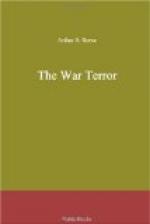The late afternoon news editions had gone to press, and I had given up in despair, determined to go up to the laboratory and sit around idly watching Kennedy with his mystifying experiments, in preference to waiting for him to summon me.
I had scarcely arrived and settled myself to an impatient watch, when an automobile drove up furiously, and Denison himself, very excited, jumped out and dashed into the laboratory.
“What’s the matter?” asked Kennedy, looking up from a test tube which he had been examining, with an air for all the world expressive of “Why so hot, little man?”
“I’ve had a threat,” ejaculated Denison.
He laid on one of the laboratory tables a letter, without heading and without signature, written in a disguised hand, with an evident attempt to simulate the cramped script of a foreign penmanship.
“I know who did the Pittsburgh job. The same party is out to ruin Federal Radium. Remember Pittsburgh and be prepared!
“A stockholder.”
“Well?” demanded Kennedy, looking up.
“That can have only one meaning,” asserted Denison.
“What is that?” inquired Kennedy coolly, as if to confirm his own interpretation.
“Why, another robbery—here in New York, of course.”
“But who would do it?” I asked.
“Who?” repeated Denison. “Some one representing that European combine, of course. That is only part of the Trust method—ruin of competitors whom they cannot absorb.”
“Then you have refused to go into the combine? You know who is backing it?”
“No—no,” admitted Denison reluctantly. “We have only signified our intent to go it alone, as often as anyone either with or without authority has offered to buy us out. No, I do not even know who the people are. They never act in the open. The only hints I have ever received were through perfectly reputable brokers acting for others.”
“Does Haughton know of this note?” asked Kennedy.
“Yes. As soon as I received it, I called him up.”
“What did he say?”
“He said to disregard it. But—you know what condition he is in. I don’t know what to do, whether to surround the office by a squad of detectives or remove the radium to a regular safety deposit vault, even at the loss of the emanation. Haughton has left it to me.”
Suddenly the thought flashed across my mind that perhaps Haughton could act in this uninterested fashion because he had no fear of ruin either way. Might he not be playing a game with the combination in which he had protected himself so that he would win, no matter what happened?
“What shall I do?” asked Denison. “It is getting late.”
“Neither,” decided Kennedy.
Denison shook his head. “No,” he said, “I shall have some one watch there, anyhow.”
CHAPTER XV
THE ASPHYXIATING SAFE




